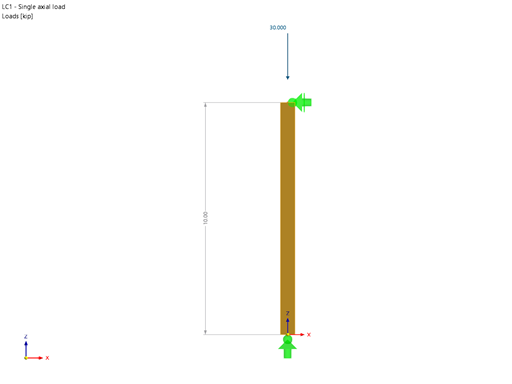From Question Marks to Manuals
Jasmin Simader studied civil engineering at the University of Applied Sciences in Deggendorf, Germany, as it matched her strengths at high school. So not an absolutely conscious decision, but – as she says – the right one in retrospect. In addition to the initial difficulties in her studies, she repeatedly looked for mentors and gradually developed the necessary understanding of structural analysis. Ultimately, a number of question marks turned into a joy working with structural analysis. Experiences that she likes to pass on to others.
She is currently working in plant engineering; that is, in large-scale industry and steelworks construction. She finds a certain diversity, especially in international projects, and is only too happy to accept a wide variety of challenges. In addition to training documents and manuals, she also creates Excel tools that can be used by project managers, salespeople, or structural engineers.
Enjoy Structural Analysis
Our Dlubal Software motto is also very popular with her and we are, of course, very pleased. What do you like most about structural engineering? She doesn't have to think twice. It's possible to calculate anything. It's fascinating and very satisfying to see how the basic principles on which our world is based can be implemented using physics.
She herself assumes that knowledge can best be conveyed if one uses pictures as an aid. We can only agree. As soon as you understand the images, you can start with formulas or build on them. How does a structure deform? What is the impact of vibrations? Everyday examples, such as a swing, are initially much more helpful than any formula.
- "I also like to do Excel tools, because I often see that standard processes have to be operated over and over again by a structural engineer. Personally, I am very lazy, and instead of works that are very similar, I want to use my time for something else."
It makes work much easier for you and for many others. Your Excel tools calculate the structures, make the dimensions of beams, and detail connections. The sales department actually only has to enter the environmental data, such as for earthquakes, and then receives the complete correct design, foundation loads, and connections. Everyone likes to work with such tools.
Structural Analysis and Structural Engineering as Male Domain
Male dominance in technical professions persists as a stubborn prejudice. What about structural analysis and design? Jasmin assumes that the industry sector is very important. In structural engineering offices, the proportion of women is already higher than, for example, in plant structures, which is very difficult because of the mechanical engineering. She has never met another woman in this structural analysis sector. But why is that?
In this case, Jasmin points out that a certain role model function is often missing. In the circle of acquaintances and friends, there are often no women who could take on such a role. It often starts with the fact that men have no female fellow students at all. This quickly gives the impression that technology is purely a man's world.
The usual problems arise. Men tend to overestimate their own achievements. Professional conflicts become personal more quickly, as many men cannot stand it when a woman corrects them or suggests alternative ways. Above all, as Jasmin describes, she experienced this in the case of older men. Years of experience are put above best practice. However, this happens not only to women, but also to young men.
Obsolete Role Models as Standard
So are the older generations to blame for making it difficult for women to enter the construction industry? Jasmine has a clear answer to this.
- "In the past, a woman even had to ask a man whether she could go to work. I just think these images are still very much anchored in people's minds."
Women face significantly more challenges when they decide on a technical profession. Only if these men have daughters, for example, who also work in technical professions, can they even consciously perceive such challenges. Jasmin mentions that these problems start with little things. For example, everything is settled in an agreement for seminars. But for women, it is not even decided what happens in the case of pregnancy and maternity leave.
Finding mentors can also be problematic. Women are rather rare and men are usually not able to advise on many topics. For example, how do you balance family and work? Many men often lack the experience.
How could women be promoted in engineering?
Jasmin talks about the usual "nine to five" working time model as an obstacle for women. More flexibility would be of great help here. She thinks the root of the problems is in the corporate culture of many companies. Performance is often considered as secondary, and power games, coupled with securing positions, are the order of the day. Women often feel uncomfortable with this, and leave these companies again and again. In the long term, this means that women will be sought in vain for these leadership positions and in management. There is also a lack of role models here that younger employees could use as a guide.
And not just that. In such companies, the tone is also often very harsh. Factual discussions often slip on the personal level. Managers have to intervene to ensure that objective discussions remain objective, but this is often lacking.
Women are usually judged personally in general. Managers talk about their appearance or ask questions about their family status. This kind of thing unsettles young women in particular. An open, modern corporate culture and a corresponding management style are basic requirements in order to finally be able to change something here.
Personal Experience
Of course, we also asked Jasmin whether she had experienced such injustices based on gender. She describes the situation of a job interview. It wasn't supposed to be, but she was asked what she would do if she got pregnant, given that she had a boyfriend. She was far from even thinking about children.
When management positions were then to be filled, it came about that a man was preferred. Why? He was just the right age and had to make a career now. And since she was a woman, she didn't have to? Such statements are not only medieval, but also absolutely incomprehensible, as we think. The person performing a task, not their gender, should be the focus. It is a sad fact that such thinking is still so ingrained.
Helping Women to Help Themselves
Jasmin is also a mental coach for sensitive women. What does that mean? She has made it her mission to help women live more empowered lives. She still hears from women that they chose family, because that is what was expected of them. Jasmin helps them to regain more independence. Women should be able to stand up for their wishes and be able to break away from social expectations. Ultimately, the goal is for them to enjoy their own lives.
In fact, it already helps many women just to hear that their desires for more in life as a family are perfectly fine. Unfortunately, the fear of being convicted for such statements is still very high among many women. To have someone in front of you who has consciously renounced children and family and is happy with it, is a great help.
Women in their mid-30s, in particular, with children who are going to school, often do not know what to do with themselves. You plunge into a crisis of meaning and do not even dare to take career steps. This is where a little understanding help can go a long way.
Change – No, Thanks?
Jasmin also knows these typical "no-sayers" whenever it comes to innovations. She says, somewhat amused, that if these conservative attitudes had always prevailed, we would all still have to walk to work today.
- "If you do not change and use this progress, you will be out of the market soon. It's comfortable and you're sitting in your comfort zone, but the world is evolving."
This progress is essential, especially in the construction industry. There are more and more standards and guidelines, but also more institutions that do the checks. Of course, customers insist on new technologies. Here, it is necessary for companies to orientate themselves on progress in order to keep pace. Otherwise, after a few years, a company is no longer marketable and no longer economical.
Advice for Young Engineers
We asked Jasmin some advice that she would give to young female engineers. She thinks networks of women – whether online or in their community – is the best way. Mutual exchange is very important. Through the stories of others, they learn that many things are not directed at them personally. It is often easy to deal with women in this industry.
However, male mentors are also a good idea. After all, there are many men in this industry who have a lot of experience and who also like to support women. In this case, it is worth actively contacting other people; for example, via LinkedIn.
The choice of a modern work environment is also important, of course. There is simply no point in women trying to be successful in an environment where they are not encouraged, or even discriminated against.
Construction Industry in Future
As always, we finally ask about the future of the construction industry. Jasmin thinks the whole thing is a bit disillusioned. On one hand, there are more and more standards, everything is more regulated and digitized, and everything is becoming more complex. On the other hand, there are only few young people in engineering courses.
- "I also often hear from friends and acquaintances that when it comes to children, they should have a solid job and definitely not become engineers. The child should become a lawyer or a tax advisor."
However, it is precisely the youngsters in this industry who are needed to implement digitization. The construction industry is just a little undervalued, quickly considered as boring and conservative. There is so much innovation in the construction industry that is just waiting for someone to implement it.
In order to be able to implement BIM and digitization reasonably, we need specialists who can ensure the quality of processes. And since this staff is lacking, less qualified personnel have to be retrained. The construction industry needs people who enjoy building and transporting knowledge. Companies must endeavor to attract such professionals appropriately. Digitization and BIM are just as much challenges as they are opportunities, since they facilitate the processes
Jasmin's personal wish is to think in a more holistic and long-term way. She has often seen that each department works in this way and that the individual disciplines are not networked with each other. Acceptance of the individual disciplines among each other must increase so that structural engineering can regain the status it actually has.
Jasmin, what is your favorite building?
- "I don't have a favorite building. I think bridges of all kinds are cool."
We can understand that well. It's also hard to choose, but bridges are a great thing. Building bridges is an important task at all levels, especially in the construction industry. Thank you for being with us!











































.png?mw=512&hash=ea9bf0ab53a4fb0da5c4ed81d32d53360ab2820c)








.jpg?mw=350&hash=8f312d6c75a747d88bf9d0f5b1038595900b96c1)
